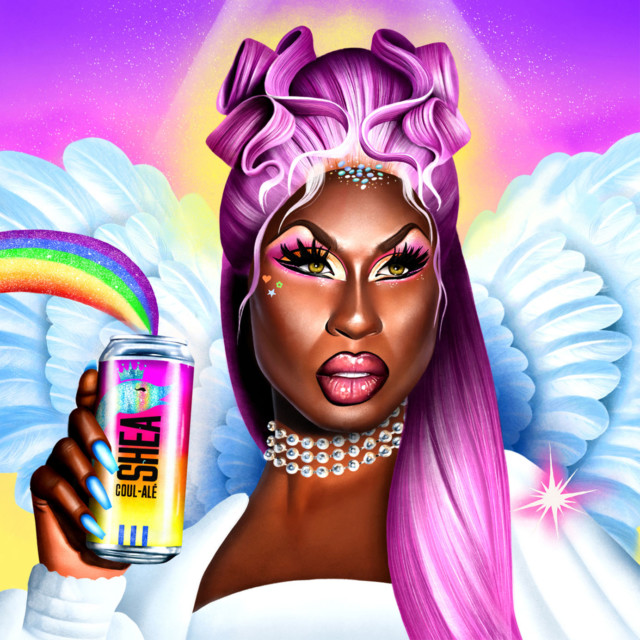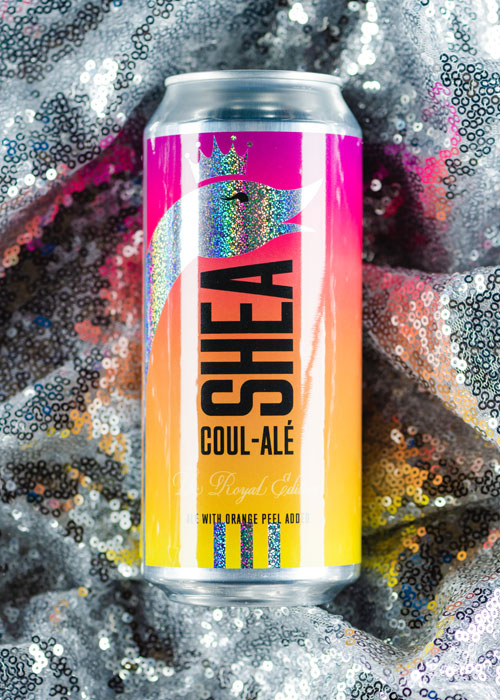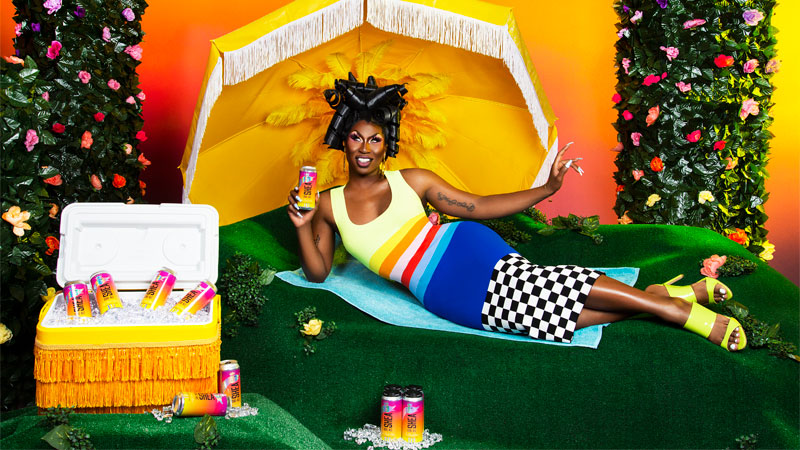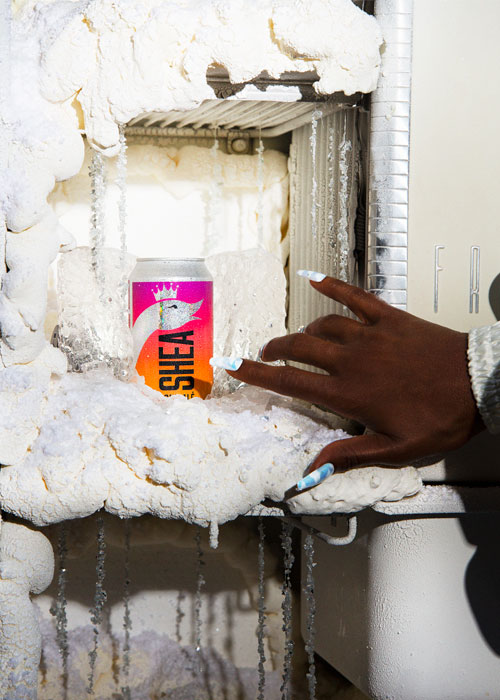Last year, performer, recording artist, and activist Shea Couleé teamed up with Goose Island Beer Co. and Do Stuff Media to launch Shea Coul-Alé, a lemony dry-hopped wheat beer for Pride Month. June 2020 saw a much different set of events, thanks to the Black Lives Matter movement coupled with the pervasive arrival of Covid-19. But the beer was a hit: According to Goose Island, Shea Coul-Alé sold out online within minutes.
Couleé, a former contestant of television’s “RuPaul’s Drag Race,” was the first drag star to collaborate with a commercial brewery on this scale. (Goose Island is owned by Anheuser-Busch InBev, one of the world’s largest brewing companies.) The move united two unique subcultures on the national stage — a Pride campaign to sell queer-friendly beer to the mainstream American public in a more authentic, genuine way. As Couleé and Goose Island revive their collaboration for 2021, it is a mainstream example of the effort to boost queer visibility in beer.
2021’s iteration is Shea Coul-Alé: Royal Edition. Pineapple and orange zest have joined the mix of ingredients, but perhaps the bigger headline is that the brew’s availability has expanded from last year’s Chicago-only sales to also include New York, Philadelphia, and St. Louis. Two dollars from every can will go to Brave Space Alliance, a Black-led, trans-led LGBTQIA+ center that’s the first of its kind on the South Side of Chicago, the city both Couleé and Goose Island call home. Goose Island is also brewing more than one run this time — good news for anyone interested in scoring a 4-pack because at the time of writing, the initial Chicago pre-order for Shea Coul-Alé: Royal Edition is once again sold out on the brewery’s website. (Hopeful buyers can try retail locations in the four aforementioned cities.)
Goose Island is certainly no stranger to quick sells and buzzed-about releases. The craft brand is credited with making barrel-aged stouts a craze, and camping out overnight for beer an almost normal thing to do. Combine that reputation with the financial backing of AB InBev, the world’s largest alcohol beverage company, and Couleé’s star power — they were a finalist on Season 9 of “RuPaul’s Drag Race” and won Season 5 of the show’s All-Stars spin-off — and Shea Coul-Alé starts to show real potential for making an impact in beer’s queer representation.
Such an impact is twofold: A little boldface-name magic goes a long way when the biggest hurdle is getting queer visibility on the beer scene’s radar to begin with, but once the spark is ignited, the energy behind collaborations like this needs to be sustained year-round, and not only for Pride Month.
Clear statistics on how well LGBTQIA+ individuals are represented in the beer industry don’t really exist. In 2019, the Brewers Association confirmed what most already knew, which is that beer is overwhelmingly white and male. For a couple of years, craft beer has been reckoning with its racist reputation; this year, reports of its prevalent sexism have pushed the industry to a change-or-die brink. Sparkly, rainbow label art alone for one month out of the year isn’t going to improve the queer inclusion element of beer’s overall improvement equation. But it could help stir up the conversation and public interest needed to make a more meaningful shift.
What makes Pride-themed beer legitimate?
Every year, more breweries join the pool of brands releasing Pride-themed products. What’s important to watch for with any Pride beer is that it’s not another example of “rainbow washing,” and that a brewery isn’t just performatively stamping a rainbow on its cans to cash in on the trend. A little quick research is often all it takes to confirm that a beer represents a brewery’s overall values and more sustained advocacy for the queer community.
“Sometimes it seems like this level of visibility is just for Pride Month, and it needs to keep going,” says Abby Fried of the flurry of Pride-themed beers that appear on tap and can lists at so many breweries each June. Fried works in the craft beer industry in New York and recently founded a meet-up group called Beers with Queers. “My goal is to keep this at the forefront always. Just because Pride Month is over doesn’t mean you’re suddenly not gay.”
Limited Pride-themed releases can get people talking, but brews with a year-round presence make a bigger difference in welcoming members of the LGBTQIA+ to the table — beers brewed year-round like Brooklyn Brewery’s Stonewall IPA, originally launched in 2017 and backed up by events and campaigns on the brewery’s part in order to be able to raise awareness and funds for the Stonewall Inn’s nonprofit, The Stonewall Gives Back Initiative.
If not brewed year-round, then effective Pride beers should at least be rooted in authentic brand messaging, proceeds going to charities, and events that echo a brewery’s support for the LGBTQIA+ community. Brooklyn-based Interboro Spirits & Ales annually brews Mad Fat Pride IPA, an extension of its year-round flagship Mad Fat Fluid IPA. This year, $1 from each 4-pack benefits The Ali Forney Center for homeless LGBTQIA+ youth, and Interboro is also hosting Pride meetups, or “Pri-Days” Fridays throughout June.
In Colorado, Denver’s queer-owned Goldspot Brewing Co. is throwing Big Queer Beerfest, where attendees can purchase pints of special Pride beers from over a dozen breweries and $1 from each sale benefits different LGBTQIA+ causes. Left Hand Brewing Co. debuted the Druicy Tart Berliner Weisse this Pride Month, with portions of sales going to the Dru Project. Left Hand celebrated the release with drag performances at its Longmont location. Another AB InBev brewery, Seattle’s Elysian Brewing, brewed a Pride beer with a story: Its Cake Topper Brut IPA was first brewed in 2019 as a response to the 2018 Supreme Court ruling in favor of a cake shop owner who refused to bake a wedding cake for a same-sex couple. Elysian released Cake Topper at a same-sex wedding it hosted at one of its locations. This year, the beer is back, available on its own or as part of a Pride Box.
And bi-coastal Athletic Brewing Co., based in Stratford, Conn. and San Diego, brewed the non-alcoholic IPA Rainbow Wall in collaboration with LGBTQIA+ climber Alex Johnson, with 100 percent of proceeds benefiting Athlete Ally.
Of course, the most important boon for queer visibility in craft beer is the growing number of queer-owned and/or operated brands. In Brooklyn, Jason Pazmino and Jon Moore launched Gay Beer, a versatile golden lager specifically geared toward welcoming the entire queer community into the beer fold and making everyone feel represented all year round. While mapping out their brand, which hit shelves in 2019, Pazmino and Moore sought to establish LGBTQIA+ individuals as both consumers and creators in an industry that largely ignores them until June.
“We saw the relevance in breaking out of how we’re marketed to,” Pazmino says. “Sometimes it can even be this disrespectful notion, that you can slap rainbow glitter on a beer and think you’ll attract this entire community.”
Pazmino points out that Pride-themed beers can be condescending, tone deaf to the fact that queer individuals are informed consumers. Fried echoes this, explaining the negative ramifications of the beer industry failing to welcome queer people into taprooms as consumers and into brewhouses as professionals. Not only does this perpetuate beer’s problematically homogenous nature, but if nothing else, one would think breweries might realize the missed sales opportunities.
“The more people interested in your beers, the more people you’re going to sell to,” Fried says. “Craft beer is overwhelmingly male and white, and yes, that is probably still a good majority of people with a flexible income, but there are so many other people that could be drinking your beer if you actually made it accessible and welcoming.”
As Gay Beer grows with availability at major retailers like Whole Foods and Walmart as well as e-commerce in 32 states via TapRm, it’s a brand poised to make a real impact in how queer people are included and represented in beer. These initiatives not only stand to improve beer’s diversity, but they can also generate positive change for specific causes thanks to beer’s relatability and accessibility.
Another recently launched beer brand, Dyke Beer, is a brand founded by Sarah Hallonquist and Loretta Chung, co-founders of Dyke Bar Takeover, a group that aims to preserve and provide safe spaces for queer women and nonbinary individuals in bars, bookstores, and other public spaces that have dwindled in recent decades. Hallonquist and Chung wanted to use a beer to raise awareness for the cause and launched Dyke Beer in October 2020 as part of that effort. Their first release is a saison brewed in collaboration with Wild East Brewing.
While recognizing the impact of and participating in industry-wide collaborations like Black is Beautiful and People Power, Wild East’s Tyler March says he and his fellow co-founders Brett Taylor and Lindsay Steen immediately understood the difference that partnering with Dyke Beer could make.
It “was less of a ‘join the cause’ and more of a ‘solve this problem’” opportunity, March says. Sure enough, Dyke Beer had a strong positive response and sold quickly. To the Wild East team, March explains, that just proved what a sizable market of craft beer drinkers there is in the LGBTQIA+ community, who are all too often excluded.
“Dyke Beer has given [them] something personal to identify with,” March says. “It proves the mission behind the beer, which is that there’s still a very active community out there that deserves their own community meeting place.”
March adds that Wild East brews Pride beers every June like other breweries, but there are 11 other months in the year that aren’t getting that focus — Dyke Beer addresses this need. During Pride and all year round, Dyke Beer hosts open mic nights, “queeraoke,” “lost dyke bar walking tours,” and burlesque and drag shows.
On a recent episode of the podcast “Brews with Broads,” Hallonquist discussed Dyke Beer’s growth into a regular, year-round contract brewing operation; in the meantime, they’ve recently debuted another collaboration, this time with Greenpoint Beer & Ale, Tallgirl Gose, a play on the colloquial “tallboy” moniker for 16-ounce cans.
Compared to queer-owned breweries and year-round beers, how much impact does a collaboration like Goose Island’s Shea Coul-Alé: Royal Edition stand to make? Is all that star power indeed enough? Or, does this feel like a gimmick, where Pride provided a trendy platform to sell beer but failed to impart much change?
“We’re happy to see inclusivity where we can get it,” says Alison Wisneski, director of marketing at Lady Justice Brewing in Aurora, Colo. “As a Latina-founded, queer-, woman-, and brewer-owned brewery, we love seeing the expansiveness of Pride events, as long as people are walking the walk, not just talking the talk.”
Wisneski adds that Lady Justice is always focused on partnering with local organizations that may not normally get the spotlight, so the team loves seeing any business of any size also extend that spotlight.
Goose Island and Shea Couleé undeniably have plenty of spotlight-sharing capability for the queer community.
Fried feels similarly, even if she admits she’s not a “Drag Race” viewer and hadn’t heard about this collaboration before since she focuses mostly on local beer in New York. “I’m glad they’re donating money to an LGBTQIA+ — and Black- and trans-led — non-profit that seems to be reputable,” Fried says. “Naturally, I’m super against ‘rainbow capitalization’ and profiting off the idea of gay Pride with no action behind it, so I think the donations to these non-profits and really putting the effort into aiding LGBTQIA+ organizations and people should be what we’re centering the conversation around.”
The very visible face of Goose Island’s Shea Coul-Alé: Royal Edition agrees with the need to sustain this energy all year in order to make queer inclusion a simple fact in the beer industry rather than a month-long trend.
“PR is not enough,” Couleé writes in an email. “People can see right through lip service and a huge part of making real change is being able to show up for these communities all year round. Not just during Pride or Black History Month. It’s about giving people a seat at the table and being okay with them making decisions that benefit them and their communities.” The drag star concludes with a hope that their collaboration can have some meaningful influence in beer and ignite a real, positive difference for all those who have felt overlooked and unheard.



